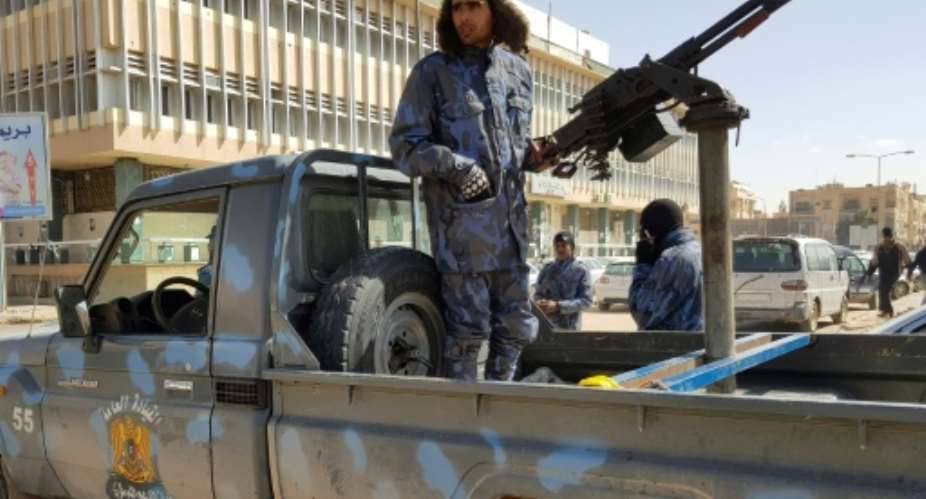Forces led by a controversial Libyan military chief manoeuvred Thursday for a threatened advance towards Tripoli as UN chief Antonio Guterres warned of the growing risk of violence.
The self-proclaimed Libyan National Army of Khalifa Haftar announced Wednesday it was gearing up to move on the west of the country including the capital, home to a UN-backed unity government.
Spokesman Ahmed Mesmari said preparations were almost complete "to purge the west of terrorists and mercenaries".
His statement was followed by troop movements on the ground, local and military sources said, as a convoy of LNA vehicles approached the city of Gharyan, some 100 kilometres (60 miles), from Tripoli.
Commander Abdessalem Al-Hassi told AFP Thursday that his forces had entered into the city without fighting.
But at least four sources in the city denied this, and a local official said there were "ongoing efforts to avoid a confrontation" between rival fighters who divide the city.
Dozens of militias have fought for control of the North African country since a NATO-backed uprising toppled and killed longtime dictator Moamer Kadhafi in 2011.
Haftar's forces have emerged as a key player, opposing the government in Tripoli and backing a parallel administration in the east.
Unity government chief Fayez al-Sarraj condemned Haftar's "escalation" and said he had ordered loyalist forces to prepare to "face all threats".
Powerful armed groups from Libya's western city of Misrata, which back Sarraj, said they "stand ready... to stop the cursed advance".
The rise in tensions came as United Nations boss Guterres visited Tripoli ahead of a planned conference later this month to hammer out a roadmap for delayed parliamentary and presidential elections.
"I am deeply concerned by the military movement taking place in Libya and the risk of confrontation," the visiting Guterres tweeted from the capital.
"There is no military solution" to Libya's woes, he added.
'Uncontrollable confrontation'
Haftar's forces in January launched another offensive into oil-rich southern Libya, ostensibly aimed at wiping out "terrorists" and criminal groups.
He has repeatedly expressed his intention to march on Tripoli.
The European Union warned that the "military buildup underway in Libya and the escalatory rhetoric... seriously risks leading to an uncontrollable confrontation".
 United Nations Secretary-General Antonio Guterres met unity government chief Fayez al-Sarraj in Tripoli as fears of a confrontation rose Libyan unity government Prime Minister Fayez al-Sarraj (R) shakes hands with United Nations Secretary General Antonio Guterres at his office in the Libyan capital Tripoli on April 4, 2019.. By - (AFP)
United Nations Secretary-General Antonio Guterres met unity government chief Fayez al-Sarraj in Tripoli as fears of a confrontation rose Libyan unity government Prime Minister Fayez al-Sarraj (R) shakes hands with United Nations Secretary General Antonio Guterres at his office in the Libyan capital Tripoli on April 4, 2019.. By - (AFP)
The United States' embassy said it "strongly condemns the increase in violence in Libya and reiterates the UN's call for restraint".
Rival leaders had agreed in Paris last year to hold elections before the end of the year, but that vote never materialised as Haftar's forces and the Tripoli government grappled for power.
The UN said Haftar and Sarraj agreed at a meeting in Abu Dhabi last month to make a new attempt to organise the elections.
Libyan analyst Emad Badi said factions in western Libya were angling for a joint front against the strongman, but "whatever the result ... Haftar will benefit from it militarily or politically".
"His progress can enhance his position in the negotiations" if the UN-backed conference set for this month goes ahead, he added.
Jalel Harchaoui, a researcher at the Clingendael Institute in The Hague, said that "taking Tripoli is certainly not an easy or risk-free task, but it's still a possibility."
"The risk of conflagration has increased," he said.





 We’ll no longer tolerate your empty, unwarranted attacks – TUC blasts Prof Adei
We’ll no longer tolerate your empty, unwarranted attacks – TUC blasts Prof Adei
 Bawumia donates GHc200,000 to support Madina fire victims
Bawumia donates GHc200,000 to support Madina fire victims
 IMF to disburse US$360million third tranche to Ghana without creditors MoU
IMF to disburse US$360million third tranche to Ghana without creditors MoU
 Truck owner share insights into train collision incident
Truck owner share insights into train collision incident
 Paramount chief of Bassare Traditional Area passes on
Paramount chief of Bassare Traditional Area passes on
 Two teachers in court over alleged illegal possession of BECE papers
Two teachers in court over alleged illegal possession of BECE papers
 Sunyani: Victim allegedly shot by traditional warriors appeals for justice
Sunyani: Victim allegedly shot by traditional warriors appeals for justice
 Mahama vows to scrap teacher licensure exams, review Free SHS policy
Mahama vows to scrap teacher licensure exams, review Free SHS policy
 Government will replace burnt Madina shops with a new three-story, 120-store fac...
Government will replace burnt Madina shops with a new three-story, 120-store fac...
